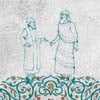Zedekiah was twenty one years old when he ascended the shaky throne of Judah, in the year 3327. He was put on the throne by the grace of Nebuchadnezzar, king of Babylon, whose power extended over Judah and all neighboring countries after his victory over Pharaoh Necho of Egypt, at Carchemish. Zedekiah, whose name was Mattaniah before Nebuchadnezzar had changed it, succeeded his nephew King Jehoiachin, who had surrendered himself to Nebuchadnezzar in order to save Jerusalem. After plundering the Beth Hamikdosh and the royal palace, and exacting an oath of loyalty from the new king he had appointed, Nebuchadnezzar returned to his land, carrying away from Jerusalem ten thousand captives, including the king and his family, the nobility of the land, and the leaders of the army.
There was great distress among the Jews in the little Jewish kingdom in the Holy Land, and even greater distress among the Jewish exiles in Babylon. False prophets and diviners arose to deceive the people with false hopes that the power of Babylon would soon be broken, and the exiles would soon return home. The true prophet of G‑d, Jeremiah, was determined to counteract this influence. He wanted to impress upon his people that the calamity that had befallen them was a punishment from G‑d for having turned away from Him and the Torah, and that the only hope left to them was to return wholeheartedly to G‑d. It was by the will of G‑d that the exiles were led captive to Babylon, and by the will of G‑d they would return at the proper time, and not before. Jeremiah sent a letter of encouragement, mingled with admonition, to the exiles in Babylon, containing the following message:
"Build houses, and dwell therein; and plant gardens, and eat their fruit; take wives, and bring up sons and daughters; and take wives for your sons, and give your daughters to husbands, that they may bear sons and daughters; that you may multiply there, and not be diminished. And seek for the welfare of the city whither you have been banished, and pray for it to G‑d, for in its welfare shall lie your welfare. For these are G‑d's words: Let not your false prophets that are in the midst of you, and your diviners, deceive you; for in falsehood do they prophesy in My name to you; I have not sent them, said G‑d. For this is what G‑d said: After seventy years in Babylon will I visit you, and fulfill My good word regarding you, and cause you to return to this place."
In Jerusalem Jeremiah continued to warn the people that the city would be doomed unless there was a general movement for repentance. But his words fell on deaf ears.
King Zedekiah broke his oath of loyalty to the king of Babylon. Ignoring Jeremiah's entreaties and warnings, he secretly entered into an alliance with the king of Egypt to throw off the yoke of Nebuchadnezzar. In the ninth year of his reign Zedekiah declared an open revolt against the Chaldeans (Babylonians). Again Nebuchadnezzar led a vast army to crush the revolt. Remaining at Riblah, he sent his troops southward under the leadership of his chief general Nebuzaradan. On the tenth day of Teveth, in the year 3336 (424 B.C.E.) the Babylonian army arrived at the gates of Jerusalem, and laid siege to the Holy City.
In desperation, King Zedekiah sent word to Jeremiah asking him to pray to G‑d for deliverance. Jeremiah replied that the fate of Jerusalem was sealed. He begged the king to surrender and spare the lives of his own children and servants, and of the inhabitants of the city. Zedekiah did not listen to Jeremiah's advice, and he refused to surrender.
Meanwhile Nebuchadnezzar was forced to abandon the siege of Jerusalem because word had reached him that the king of Egypt was marching against him with a large army. There was jubilation in Jerusalem, but Jeremiah predicted that the Chaldeans would return to destroy the city. Jeremiah, who had been barely tolerated in the past, was now accused of being an agent of the enemy, and he was thrown into a dungeon. However, the king ordered that the prophet be brought before him, and asked him for a message from G‑d. Jeremiah could only repeat what he had told the king before, adding the request for a better prison than the dungeon in which he had been held. The king granted his request, and every day the prophet was given a loaf of bread, until the supply of bread in the besieged city gave out.
Jeremiah's repeated predictions of the fall of the city, and his pleas for surrender, roused the anger of the defenders of the city. The prophet was seized by his enemies and thrown into a pit, where he almost drowned in mud. A servant of the king, by the name of Ebed Melech of Kush, reported to the king of the prophet's plight. The king ordered the servant to pull Jeremiah out of the pit, and Jeremiah's life was saved in the nick of time. Again Jeremiah was brought before the king, and Zedekiah asked him for the Divine message, assuring him protection from his enemies. Then Jeremiah told the king that if he would leave the city and surrender to the Babylonians, he would live, and the city would be spared. But Zedekiah lacked the courage to act on the prophet's advice, fearing that the people would consider him a traitor and a coward. Jeremiah was placed in the safety of the king's prison, where he remained until the fall of Jerusalem.
In the eleventh year of Zedekiah's unfortunate reign, in the month of Tammuz, after a long siege, during which hunger and epidemics claimed countless victims in the besieged city, the walls of Jerusalem were breached by the enemy. The king fled through a tunnel that led from his palace beyond the city gates, but he was captured in the plains of Jericho, and brought before Nebuchadnezzar in Riblah. There, the king's sons and many other Jewish princes were slain before Zedekiah's eyes; then his eyes were put out, and he was led in chains to Babylon.
In the meantime, Nebuzaradan began the destruction of Jerusalem. The walls of the city were torn down, and the royal palace and other structures were set on fire. On the ninth day of Av, towards the evening, the Beth Hamikdosh was set on fire and was destroyed, after it had been despoiled of all its treasures, and the holy golden vessels which were there since the days of King Solomon. All these were taken as booty and carried off to Babylon. The High Priest Seraiah and many other priests and high officials were put to death. There was a fearful massacre of defenseless inhabitants, and many thousands of people who had escaped the sword were taken prisoner and led into captivity in Babylon. Only the poorest of the residents of Jerusalem were permitted to stay, in and around the ruined city. Over these Nebuchadnezzar appointed a governor, Gedaliah the son of Ahikam, a friend of Jeremiah.
Jeremiah himself, on Nebuchadnezzar's orders, was released from prison. The Babylonian king gave him the choice between remaining in his native land or going to Babylon, not as a captive but as an honored guest. Jeremiah preferred to stay and end his days on the holy soil of Judah.
Thus ended the kingdom of David, until it shall be restored again, as promised by G‑d through His holy prophets. The destruction and exile had been predicted by Moshe Rabbenu, and the catastrophe came to pass with all the horrors of which the Torah had warned. Realizing this, the people also remembered another prophecy of Moshe, that G‑d would preserve His covenant with His people. This prophecy contained the following words: "Yet, for all that, though they may be in the land of their enemies, will I not cast them away, neither will I despise them to destroy them completely, to break My covenant with them. And I will remember unto them the covenant of their ancestors, whom I brought forth out of the land of Egypt before the eyes of the nations, that I may be unto them G‑d."
* * *
The First Beth Hamikdosh, built by King Solomon, stood for 410 years, until it was destroyed by the Babylonians in the year 3338. Seventy years later, as Jeremiah prophesied, the exiles returned and built the Second Beth Hamikdosh. It stood for 420 years, from 3408 until 3828, when it was destroyed by the Romans. Ever since then we have been waiting for the promised Messiah, a descendant of King David, to gather in our exiles and build the Third Beth Hamikdosh, never to be destroyed again. This prophecy, too, will be fulfilled as surely as the others.













Join the Discussion